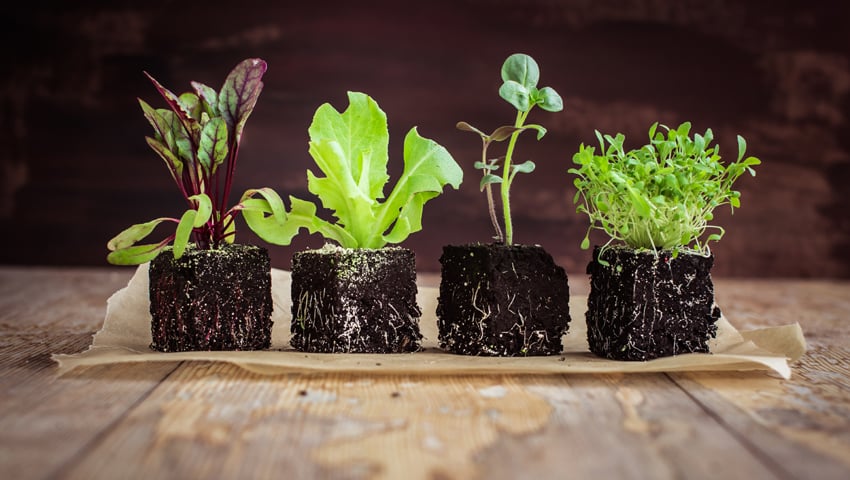This article first appeared on the Wicked Leeks website. It was written by Rebecca Bragg and is republished with kind permission.
The horticulture industry has been reliant on peat since the 1960s. A highly effective medium to support the growth of seedlings, it has physical, chemical and biological properties that make it a superior blocking medium (i.e. growing media that contains woodchip, compost or coir). However, our peatlands are also incredibly important and useful ecosystems, sequestering approximately one third of the world’s terrestrial soil carbon. By using peat to grow our food, we are turning peatlands from carbon sinks to sources and that’s something we’re not happy about… we just need to find a better way.
The truth is (and this is something we’ve always been transparent about), at Riverford we’re presently reliant on peat to grow lettuce. A growing medium containing around 80 per cent peat is compressed into blocks. The lettuce seeds are then sown into these blocks and placed in a glasshouse where they germinate and grow to planting-out size. When they’re ready, they’re planted into our fields and polytunnels.
Peat is naturally ‘sticky’ and peat-free alternatives tend to crumble when compressed into blocks. Additionally, the industry has the challenge of identifying a peat-free blocking medium that will support the biological and nutrient requirements of a flourishing lettuce seedling.
In April 2023, Riverford Sustainability Researcher Anna David kicked off our collaborative project with Delfland Nurseries and Coventry University, with support from Cambridge Eco Ltd. The project is funded by Innovate UK and aims to find a peat-free blocking medium. There are three main stages to the project. Stage one involves identifying UK-sourced materials that have the potential be included in a peat-free medium. These materials have undergone physical, chemical and biological analyses at Coventry University to assess their potential for supporting seedling growth. Stage two is currently underway at Delfland Nurseries, where five potential peat-free mixes have been compressed in Delfland’s industrial blocking machine. Our initial observations indicate that we are one step closer to a positive, sticky solution as all of our peat-free combinations have survived the blocking process (great news!).
Over the coming weeks, germination will be monitored and the health of the seedlings will be compared to seedlings grown in the nursery standard blocks that contain 80 per cent peat. Finally, over the course of spring and summer, lettuce blocks will be planted into our fields at Wash and Sacrewell Farms. The next challenge that our peat-free blocks will face is the tractor-towed planter. We use a planting machine in order to plant 5000 lettuce plants per hour. It’s vital that the blocks and plants can survive this machine.
As with all issues facing our food system, the peat dilemma is nuanced. We know that the extraction of peat is a major source of greenhouse gas emissions and is destroying precious, rare habitats. However, we are cautious of replacing peat with materials that will have similar ecological impacts or cause social injustice along the supply chain. As often happens when industry looks for a more palatable alternative, due diligence is ruled out in favour of a quick-fix, PR-friendly solution. We’ve always avoided the latter, but it takes time. In an ideal world, we would use local materials that are part of a circular economy – the challenge being of course that we don’t live in an ideal world! At the end of the project the economic and environmental consequences of phasing out peat from organic and conventional horticulture will be also assessed.
Phasing out the use of peat from organic and conventional horticulture is a challenging undertaking. It requires collaboration between different sectors, particularly industry and academia. The research requires experts in soil science to identify combinations of materials that support optimal plant growth. Simultaneously, the research requires experienced and skilled plant raisers and growers who are able to make the findings practically applicable within the wider food system. Cross-sector research is vital for addressing what are sometimes called ‘wicked’ problems in our food system. Horticultural research of this type is few and far between in a backdrop of a sector that is underappreciated and under-prioritised.
It is still early days for our peat-free project, but we’re optimistic.
Rebecca Bragg is Sustainability Researcher at Riverford Organic Farmers
